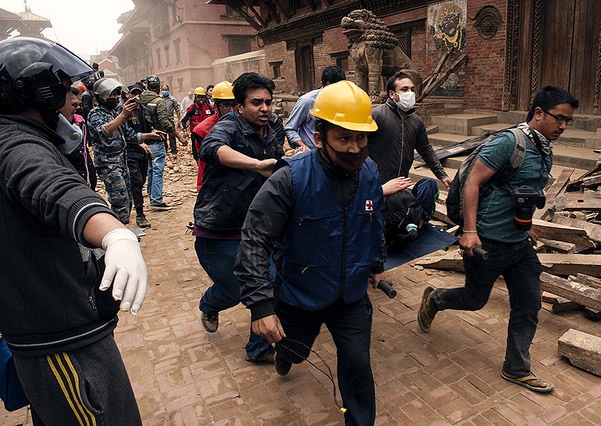Israel’s “Selective Compassion”
Israel's conduct in the aftermath of the Nepal earthquake has revealed much about the country's values.

The aftermath of the 7.9 magnitude earthquake that struck Nepal on April 25. International Federation of Red Cross / Flickr
Metaphorical aftershocks from the earthquake that recently devastated Nepal, killing thousands, continue to be felt in the state of Israel — nearly 5,000 kilometers away.
How come?
For starters, Nepal is a common destination for Israeli tourists, including ones who have just completed their military service; apparently, the country’s natural landscape and cheap prices make it an ideal spot to unwind after prolonged engagement in Palestinian oppression.
According to the Times of Israel, the country far outshone others in terms of rescuing stranded citizens. In a matter of four days, nearly all of the approximately two thousand Israelis affected by the quake had been rescued, with just one Israeli unaccounted for. (France, it was noted, had still failed to account for about half of its citizens in Nepal.)
The Times describes the rescue operation:
Four planes were sent to airlift Israelis out, along with helicopters and jeeps rented for the effort, while a combination of IDF, insurance company-sponsored rescue teams and various volunteer groups helped reach nearly all the Israelis stranded in remote parts of the mountainous country.
Run-of-the-mill Israeli tourists were not the only ones on the receiving end of relief efforts. Quickly stealing the spotlight were babies born to surrogate mothers in Nepal on behalf of same-sex Israeli couples.
Because gay couples are prohibited from relying on surrogates within Israel, many have sought to fulfill child-production aspirations abroad — and in Nepal, the process is up to five times cheaper than in other locations.
India was previously a preferred surrogacy hub for Israelis, but when new regulations in 2013 significantly restricted that particular outsourced industry, much of the business migrated to Nepal, along with a number of Indian surrogate mothers.
In recent weeks, twenty-six babies destined for Israeli couples were born in Nepalese territory. In the aftermath of the earthquake, they were all evacuated to Israel — sans the proper paperwork and sans the women that gave birth to them. TIME reported that the director of the international department of the Red Star of David, Israel’s national emergency medical response organization, “said that in addition to operating [a] field hospital [in Kathmandu] and assisting local doctors, the evacuation of the newborn children had been his organization’s top priority.”
But consider the implications of the surrogate baby rescue effort. According to a surrogacy expert at the University of Haifa interviewed by the Jerusalem Post, the imported babies may face religious obstacles from local rabbinates on account of the fact that “the fetuses were produced by the men’s sperm and ova purchased in the US, South Africa and other countries from non-Jewish women.” Of course, this hasn’t prevented the Israeli government from temporarily waiving the bureaucratic requirements for the babies to enter the country.
What this means is that embryos that have gestated in Nepal — often the offspring of a non-Jewish mother and carried by a non-Jewish surrogate — can effectively claim a birthright to the self-appointed Jewish state, while Palestinians literally born in the land cannot.
As for still-gestating embryos in Nepal, TIME notes that one hundred additional Nepalese and Indian women in the earthquake-ravaged nation are currently carrying babies for Israelis.
The Israeli interior minister, with support from various government institutions, has proposed allowing the surrogate moms to travel to Israel to complete their pregnancies, although no arrangements have thus far been made. Nor has it been explained what will happen to said women once they deliver their finished products to respective clients. (Israel generally isn’t in the market for a surplus of non-Jews with darker skin.)
Meanwhile, all of Israel’s self-conducted fanfare over its various contributions to disaster relief in Nepal (including selectively air-lifting made-for-Israeli babies, which doesn’t really help the majority of disaster victims) serves to distract from the fact that it is actively inflicting disaster at home.
A recent Haaretz op-ed on Israel’s “selective compassion” illustrates how the country’s intermittently impressive humanitarian performance abroad — not only in Nepal but also in Haiti, Japan, and elsewhere — isn’t attended by any similar humanitarian concern for the Gaza Strip, where the regular carnage and infrastructural damage is hardly a result of natural disasters.
The institutionalized Israeli disregard for certain human life forms is underscored by its treatment of pregnant Palestinians, who frequently find themselves under bombardment or going into labor at Israeli checkpoints — both situations highly conducive to fatalities. Emergency airlifts are never proposed in response.
In the case of the Nepal earthquake, some Israelis have managed to cast themselves as the fundamental victims. A Huffington Post article quotes one half of a gay couple expecting twins from an Indian surrogate in Kathmandu on the difficulties of procuring children: “We’ve had ups and downs, and a fucking earthquake. When we finally get to meet our babies, we’re just going to sit down and cry.”
Never mind all of the folks who perished, or the often exploitative and dangerous nature of the gestational-surrogacy industry itself.
If only justice were an industry.